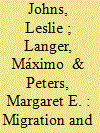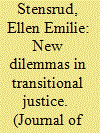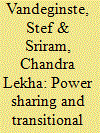| Srl | Item |
| 1 |
ID:
187657


|
|
|
|
|
| Summary/Abstract |
Domestic courts sometimes prosecute foreign nationals for severe crimes—like crimes against humanity, genocide, torture, and war crimes—committed on foreign territory against foreign nationals. We argue that migrants can serve as agents of transnational justice. When migrants move across borders, as both economic migrants and refugees, they often pressure local governments to conduct criminal investigations and trials for crimes that occurred in their sending state. We also examine the effect of explanatory variables that have been identified by prior scholars, including the magnitude of atrocities in the sending state, the responsiveness of the receiving state to political pressure, and the various economic and political costs of prosecutions. We test our argument using the first multivariate statistical analysis of universal jurisdiction cases, focusing on multiple stages of prosecutions. We conclude that transnational justice is a justice remittance in which migrants provide accountability and remedies for crimes in their sending states.
|
|
|
|
|
|
|
|
|
|
|
|
|
|
|
|
| 2 |
ID:
085438


|
|
|
|
|
| Publication |
2008.
|
| Summary/Abstract |
This article argues that the mixed tribunals of Sierra Leone and Cambodia provide important lessons about the problems and dilemmas in achieving the legitimacy that is necessary for transitional justice mechanisms to have a positive local impact. High hopes have been held for the mixed model, but experiences show that this model is no easy fix to the legitimacy problems faced by the international tribunals for the former Yugoslavia and Rwanda. By locating a tribunal in the post-conflict setting, new dilemmas of legitimacy may arise. This article suggests that transitional justice mechanisms should strike a balance between backward-looking and forward-looking justice, and between international and national participation in the tribunals, but this is not done by simply locating a tribunal in the affected country.
|
|
|
|
|
|
|
|
|
|
|
|
|
|
|
|
| 3 |
ID:
108962


|
|
|
|
|
| Publication |
2011.
|
| Summary/Abstract |
Recent peace negotiations practice has given rise to the emergence of two paradigms. In line with normative developments in global human rights protection, internationally brokered peace processes often address the options for accountability for abuses committed in the past and generally cannot include blanket amnesties. At the same time, many agreements end armed conflicts by offering power-sharing incentives for warring parties. In most cases, power-sharing arrangements are likely to clash with attempts to meaningfully deal with truth, accountability, and reparation for past abuses. The tension between the two paradigms gives rise to a number of important challenges and constraints for policymakers and, thus far, there is little practical evidence to guide them in managing the clash.
|
|
|
|
|
|
|
|
|
|
|
|
|
|
|
|